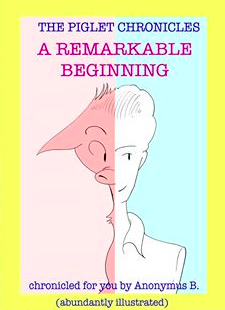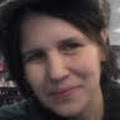What is the role of children's literature?

What is the role of children's literature in this digital age? What and how do we want our children reading, and where do we find books that teach, explore, and guide young readers? How can books hope to compete with multi-media and online options?
These are tough questions facing any author writing in the children's literature genre these days. I am lucky to know and work with one such author, Ayse Buchara, a European author who is the founder of Fortunate Dreams Publishing and author of The Piglet Chronicles. Buchara's books tackle challenging issues and themes with imagination and straightforwardness, and I think they are some of the best books 12 year old boy readers could find to start exploring real-world issues.
She agreed to talk with me over email about how she got interested in writing children's literature, how she thinks about the print vs. digital questions as an active author, and her quest to open the door to fantasy for young readers.
Interview with Ayse Buchara

Scott: Who are you? Tell us about yourself.
Ayse: First of all I am a lover of children's literature and really good kid shows like "The Backyardigans" or "Wonder Pets" for toddlers. I love the moment when a child finds out she or he can enjoy stories, because the key to a huge world is giving him or her at that moment and a great adventure begins. I wish every child could make his own way through the book jungle making out friends and enemies, but trends keep children away from such freedom, unfortunately.
I am a story teller of course and I love to watch how stories grow in the mind and can be shared with others. I have been writing in three languages, Turkish, German and English, so I believe that I am someone you may call a globalized writer. I was a cold-war kid and as Billy Joel puts it: Cold war kids are hard to kill, so I reckon I am a survivor of some kind. I must say I am happy to have been a part of all that development in the city of Berlin after the fall of the wall. Being a child in Turkey in the sixties and raising a child in Berlin in the nineties was altogether very exciting.
I see myself as a provider of good thoughts and helpful and emphatic stories for children and youngsters. I hope they read at night in the light of their pocket lamps after the lights were switched off by higher authorities and enjoy the freedom of doing so.
Why did you decide to stop working in film and become an author?
I think I got more courageous in time.
Where do you see Fortunate Dreams and The Piglet Chronicles series in three years?
On iPads and Kindles and hopefully also in bookshelves. We are trying hard to make this series special.
What differences do you see between children's literature in Germany and/or Europe and the US? Is that a market obstacle as an author looking to sell books?
Historicaly seen there is no difference between Toby Taylor, Thomasina, Tom Sawyer, Ann of Green Gables, Polyanna, Mary Poppins, Paddington or Peter Pan and Wendy. There is also no difference between Betsy Byars' books and all that wonderful Swedish children's literature German kids have an opportunity to read.
But then there came a new era of children's books. I would call it the filmable/merchandisable genre book era. The main problem with this kind of literature is that it is group-centered. It doesn't approach individuals with their very individual problems. (In approching the individual child Betsy Byars is my hero). It makes a fan-group kind of big audiance out of individuals. Take Harry Potter as an example. In this there is also no difference between Europe and the USA.
So where the differences are, the real literature may be. Betsy Byars isn't well known in Germany and I think American children didn't read many of Klaus Kordon's books, but everybody knows about The Diary of a Whimpy Kid.
The biggest market obstacle remains the marketing power of the powerful on both sides of the ocean, especially if you are new and different. Children wouldn't say no to something new and different if they were asked individually.

What kind of reception is A Remarkable Beginning getting so far?
Kids love the illustrations. As far as I had the opportunity to talk to them about the story they were surprised by the way I see things but also interested and afffirmative.
What's the most surprising thing about being an author?
Suddenly to know how important and colourful every detail in life is.
What do you think is the role of imagination in children's literature?
I would say imagination is a good guide to reality if you are honest. It becomes a dangerous tool if you are trying to comfort children with tales and happy endings or serve their curiosity without any liability. We may find a generation unhappy because there are no vampires waiting for them out there.
The adult imagination may be trying to ease the mind of the adult in everyday life while children use imagination to find adventure or compensate for what is not going well in their life. Having little or no money in their purses, and nothing particular to interest them on shore, they may want to sail about a little and see the watery part of the world, as Hermann Melville would say. So we have to take them out to find the whale. And we are not allowed to lie about Captain Ahab.
Why did you decide to write in English?
It promised to become a great adventure and it did. And I had a skilled editing consultant in Chris Trengove who didn't speak German. And I do not really have a native language, I am a nomad anyway.
What are some of your favourite books for children?
"The Eightienth Emergency" by Betsy Byars. "Horton Hatches The Egg" by Dr. Seuss. "Wild Things" by Clay Carmichael. And if a young one really reads, why not "Moby Dick" or "Oliver Twist" in an unabridged version? We should challenge their patience and their perseverance. If you see your child read for hours it may be time to meet Mr. Dickens or Mrs. Bronte.
By the way my book is an easy read.
What was the impact of books in your chilhood? How did they help you?
I loved Mary Poppins and Dr. Dolittle, and I read a lot of Rene Guillot's books about adventures in India and Africa and a lot of Jules Verne books. I loved "Toby Tyler" and "A Little Princess".
They helped me not to accept manmade borders to a God given life.
And they taught me to love the world and look for justice. Years later a French Professor I saw on TV who was an expert on Jules Verne said that Jules Verne taught the French nation of his time to love the world and all of a sudden I knew why I love countries I have never been to.
Books were extremely important in my childhood. And they are still. I still think of Mary Poppins when I help children who have problems in school.
--
Are you a children's literature author or reader? What do you think of Buchara's work and perspective?
Image sources:

0 comments